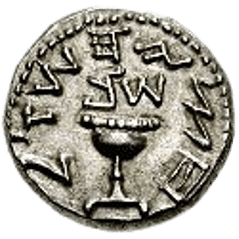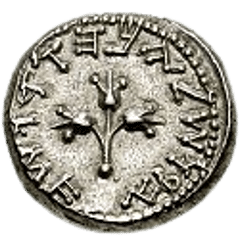
Machatzit HaShekel
The mitzvah of the half-shekel is explicitly mentioned in the Torah. At the beginning of Parashat Ki Tisa, Hashem commands Moshe Rabbeinu to count the Jewish people by collecting a coin of equal weight from each person as atonement for the sin of the Golden Calf:
“Each man shall give Hashem an atonement for his soul… a half-shekel… a donation to Hashem.”
The mitzvah of the half-shekel was given as a “remedy before the affliction,” countering the future decree of Haman, which also began with the giving of silver coins, as Haman said to Achashverosh:
“I will weigh out ten thousand talents of silver… into the king’s treasury.”
Haman plotted to destroy the Jewish people, G-d forbid, but Hashem told him: “The Jewish people have already preceded you by giving their shekels for the atonement of their souls, thereby nullifying your evil scheme in advance.”
For this reason, our Sages instituted the giving of the Zecher LeMachatzit HaShekel (a remembrance of the half-shekel) close to Purim, emphasizing its power to atone for the Jewish people and serve as a merit against those who seek our harm.
To whom is the Zecher LeMachatzit HaShekel given?
In the early sources regarding this custom, it is written that the donation should be given to the poor of the city for their Purim needs. However, halachic authorities later wrote that it can also be given for other charitable purposes. The most ideal way is to donate the money to Torah institutions, which in our times are analogous to the Mishkan and the Beit HaMikdash. Many also direct the funds to help needy families.
Until when can the half-shekel be given?
In Masechet Sofrim, it is stated that the Zecher LeMachatzit HaShekel should be given before Shabbat Zachor. However, in practice, the commonly accepted custom varies:
•Among Sephardim and some Ashkenazi communities, it is given on Purim night before the reading of the Megillah. Some give it before the morning Megillah reading.
•Among most Ashkenazi communities, it is given on Ta’anit Esther (the Fast of Esther) during Mincha.
However, according to the strict halacha, it may be given as early as Rosh Chodesh Adar, following the principle of “Zerizin makdimin le-mitzvot” (the diligent hasten to fulfill mitzvot).
The amount given as Zecher LeMachatzit HaShekel is approximately 40 shekels per person, though some have the custom to give 180 shekels for the entire family.
It is recommended to recite this prayer when giving:
“Master of the Universe, it is known and revealed before You that when the Beit HaMikdash stood, each individual in Israel would give a half-shekel in the month of Adar for the service of the Temple, as atonement for them. And now, due to our many sins, the Beit HaMikdash is destroyed, and we are unable to fulfill this mitzvah of the half-shekel. Therefore, may it be Your will, Hashem, our G-d and G-d of our forefathers, that our reading of the section about the half-shekel and our giving of this money as a remembrance of the half-shekel to charity be considered before You as if we have fulfilled this mitzvah in practice, along with all the mitzvot included in it in the supernal realm. And may the pleasantness of Hashem, our G-d, be upon us, and establish the work of our hands for us; may He establish the work of our hands.”
The Deeper Meaning of the Half-Shekel
In the Hebrew word Machatzit (מחצית), the central letter is Tzadi (צ), and the letters adjacent to it spell Chai (חי – life). The letters furthest from it spell Met (מת – death).
The Tzadi symbolizes Tzedakah (charity), which in our times is the primary fulfillment of the mitzvah of the half-shekel.
One who distances himself from charity and turns a blind eye to the needy, distances himself from the root of life and draws upon himself suffering. A home that is open to the poor will not be open to illnesses and tragic news, G-d forbid.
On the other hand, one who is close to the mitzvah of Tzedakah, and gives generously with a kind heart and joy, protects himself and his household from harm and misfortune, as it is written:
“Tzedakah saves from death.”
Moreover, such a person draws upon himself and his family an abundance of good, long life, as it says:
“One who pursues righteousness and kindness will find life, righteousness, and honor.”
He is thus considered truly alive.

Machatzit HaShekel form
your details
Donation details
(Around 180₪)
for the entire family
X
(Around 40₪ )
Per Person
–
Family Members
Pleas Enter your custom amount
wants to add "matanot laevionim?"
payment details
$US
$US
Chabad of Guangzhou @ copyright

